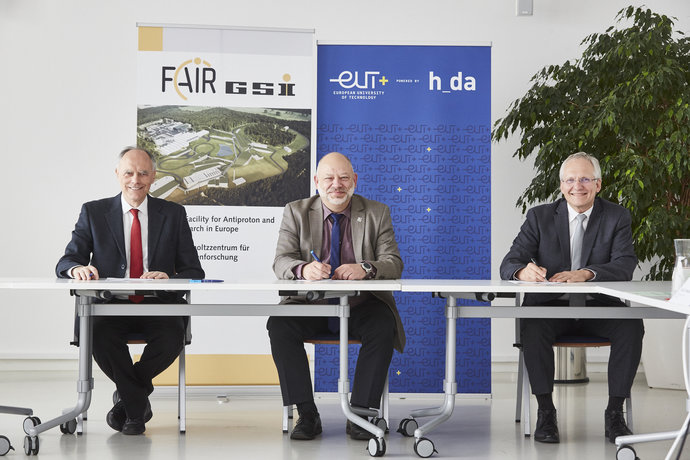
Darmstadt University of Applied Sciences (h_da), as representative of the
“European University of Technology” (EUt+), GSI Helmholtzzentrum für Schwerionenforschung (GSI Helmholtz Centre for Heavy Ion Research) and the FAIR accelerator centre have signed a contract aimed at deepening their cooperation yesterday. Over the longer term, the “GET_INvolved” Programme will offer students and researchers the possibility to complete internships and research visits at GSI/FAIR. It is open to all students…
![[Translate to English:] [Translate to English:]](/fileadmin/_processed_/1/d/csm_FCC_1_68fb99130f.jpg)
The construction for the FAIR Control Center (FCC) has begun. The start of work is an important step in the construction of the international accelerator center FAIR (Facility for Antiproton and Ion Research) and marks a decisive moment for one of the largest construction projects for research worldwide. On March 29, 2022, the symbolic laying of the foundation stone for the new building took place on the construction site directly at the western entrance to the GSI Helmholtzzentrum für…

Professor Giubellino will continue to lead the world-class scientific program of GSI and FAIR as Scientific Managing Director of the GSI Helmholtzzentrum für Schwerionenforschung GmbH and the Facility for Antiproton and Ion Research in Europe GmbH (FAIR GmbH) for the next five years. The FAIR Council and the GSI Supervisory Board, impressed by the achievements in his first term, have expressed their wish for him to serve for a second term that started on January 1, 2022.

The “Erwin Schrödinger Prize 2021 — The Stifterverband Science Award” goes to an international team at the Helmholtz Institute Mainz HIM, a cooperation of the GSI Helmholtz Centre for Heavy Ion Research and the Johannes Gutenberg University Mainz: With the cost-effective and extraordinary amplification of magnetic resonance signals, the experts have developed a technique that has promising uses in analytics.

The new program of the lecture series “Wissenschaft für Alle” of GSI and FAIR for the first term of 2022 has made it its motto to visualize the invisible. It is about the small and big aspects in microscopy and space as well as about possibilities to make information perceptible and tangible. The series will continue in an online format until further notice; interested parties can connect to the video conference events via a dial-up link using an internet-enabled device such as a laptop, cell…

Professor Gabriel Martínez-Pinedo will receive the 2022 Gottfried Wilhelm Leibniz Prize from the Deutsche Forschungsgemeinschaft (DFG, German Research Foundation). This is most important and highest endowed German research prize. Martínez-Pinedo is award for his outstanding work at the interface between astrophysics, nuclear physics and neutrino physics. He researches and teaches at the Institute for Nuclear Physics at the TU Darmstadt and at the GSI Helmholtzzentrum für Schwerionenforschung in…

Two young researchers have been awarded this year's Christoph Schmelzer Prize: Dr. Theresa Suckert from the Technical University of Dresden and German Cancer Consortium (DKTK), partner site Dresden, and Dr. Felix Horst from the University of Giessen. With this award, the Association for the Promotion of Tumor Therapy with Heavy Ions e.V. annually honors outstanding master's respectively doctoral theses in the field of tumor therapy with ion beams.

Which are the best applications for tumor therapy with charged particles to realize its great potential for the future? In which cases can it be used most effectively? These aspects belong to the most exciting questions in radiation biology and medical physics. A group of top-class experts now evaluated and summarized the state-of-the-art of heavy ion radiotherapy and presented a review article in the world-renowned online journal "Nature Reviews". Main author of the text with the title „Physics…

How are chemical elements produced in our Universe? Where do heavy elements like gold and uranium come from? Using computer simulations, a research team from the GSI Helmholtzzentrum für Schwerionenforschung in Darmstadt, together with colleagues from Belgium and Japan, shows that the synthesis of heavy elements is typical for certain black holes with orbiting matter accumulations, so-called accretion disks. The predicted abundance of the formed elements provides insight into which heavy…














